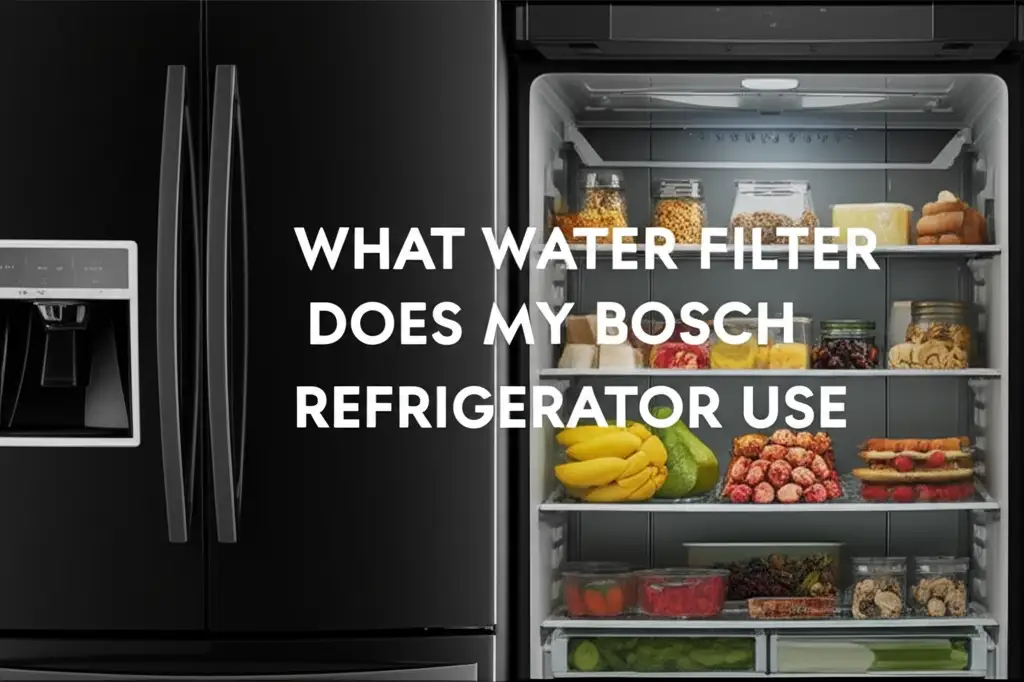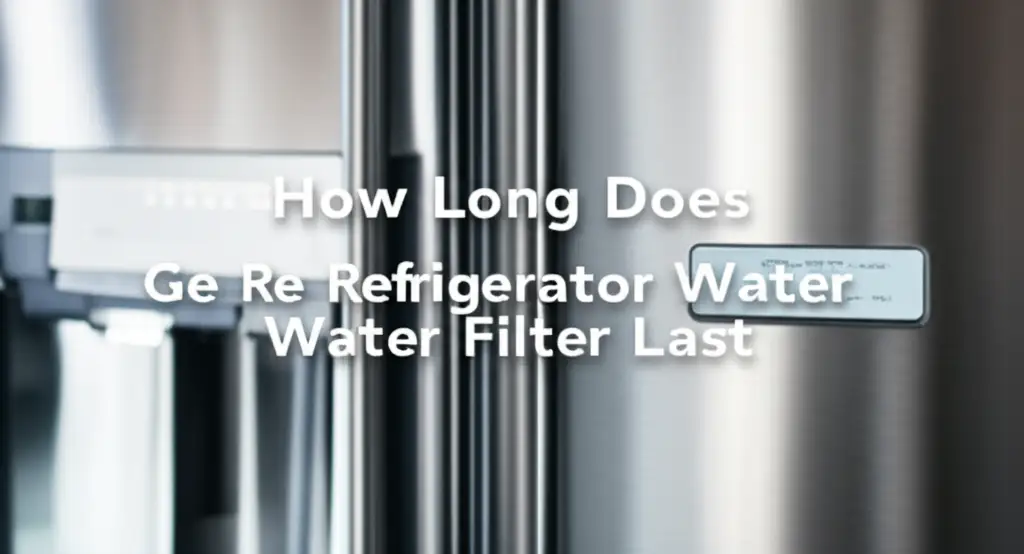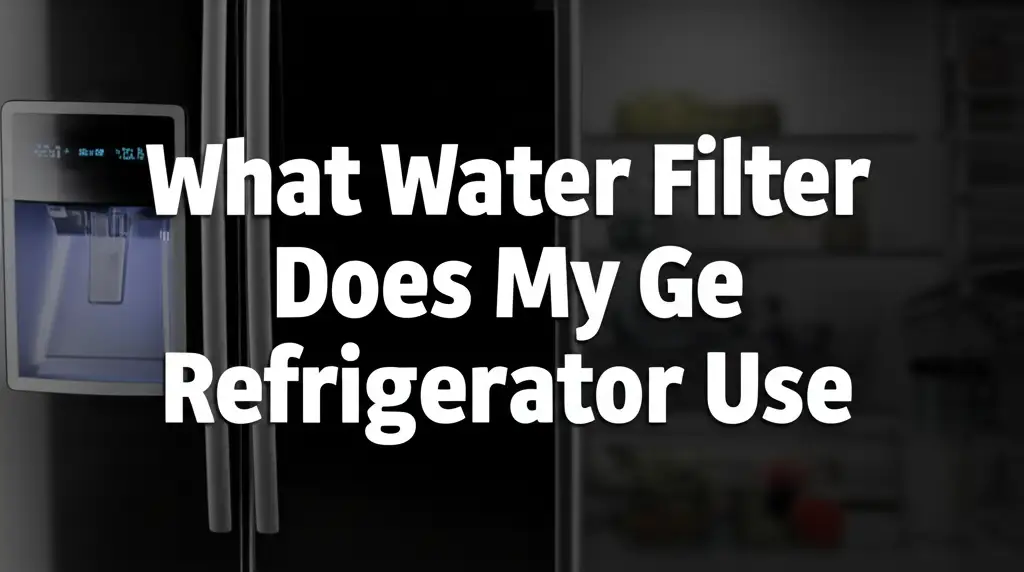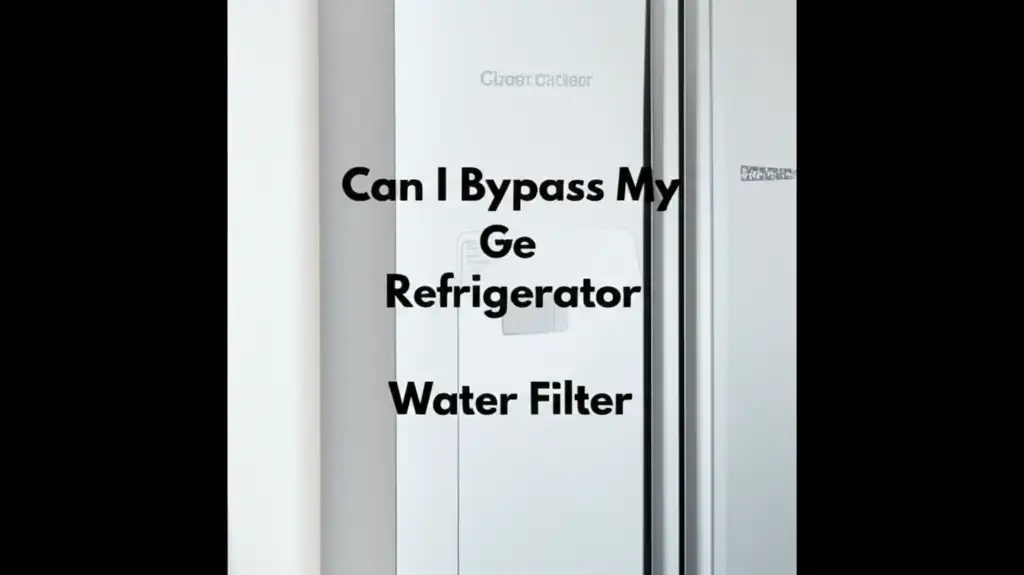· Todd Martin · Refrigerator Maintenance · 19 min read
What Water Filter Does My Bosch Refrigerator Use

Unlock Pure Refreshment: What Water Filter Does Your Bosch Refrigerator Use?
Have you ever wondered about the crisp, clean water flowing from your Bosch refrigerator’s dispenser? That fresh taste comes from a vital component: the water filter. Knowing what water filter does my Bosch refrigerator use is important for maintaining water quality and appliance performance. A proper filter ensures your drinking water is free from common contaminants. It also protects your refrigerator’s water system.
This guide will help you identify the correct filter for your Bosch model. We will discuss why filtration matters, how to replace your filter, and how to troubleshoot common issues. We aim to make sure you always enjoy great-tasting, clean water. Keeping your Bosch refrigerator filter updated helps it work its best. Let’s explore everything about Bosch refrigerator water filters.
Takeaway
- Identify your Bosch refrigerator’s specific water filter by model number or existing filter.
- Replace filters every six months or when the indicator light appears.
- Always use genuine Bosch filters or certified compatible alternatives.
- Proper filter installation prevents leaks and ensures clean water flow.
Clear Answer
Your Bosch refrigerator typically uses either an internal UltraClarity or UltraClarityPro water filter, or an external inline filter, depending on the model. You can find the specific filter type and part number in your refrigerator’s owner’s manual, on the existing filter cartridge, or by checking the model number on Bosch’s official website.
Understanding Bosch Refrigerator Water Filter Types
Bosch refrigerators are known for their sleek design and advanced features. This includes their water filtration systems. To know what water filter does my Bosch refrigerator use, you must understand the main types. Bosch primarily uses two distinct internal filter designs: UltraClarity and UltraClarityPro. Some older or specific models may use an external inline filter. Each filter type serves to clean your water, but they differ in design and installation.
Most newer Bosch models feature internal filters. These filters fit neatly inside the refrigerator compartment. This design keeps the filter hidden and easy to access for replacement. External inline filters connect to the water line behind the refrigerator. These are less common with modern Bosch units but still exist for certain configurations. Knowing your filter type is the first step toward proper maintenance.
Internal Bosch Filters: UltraClarity and UltraClarityPro
The UltraClarity and UltraClarityPro filters are Bosch’s most common internal filter types. They offer advanced filtration for your drinking water and ice. These filters are designed to fit specific Bosch refrigerator series.
- UltraClarity Filters (e.g., BORPLFTR10, 644845, REPLFLTR10): These filters are widely used in many Bosch 800 series and earlier models. They reduce chlorine taste and odor. They also filter out cysts, lead, mercury, and other contaminants. You will usually find them inside the refrigerator compartment. Their location is often in the upper right corner or tucked into a dedicated compartment. They have a twist-and-lock or push-in mechanism for easy installation.
- UltraClarityPro Filters (e.g., BORPLFTR55, 11025821, REPLFLTR55): These are an upgrade from the standard UltraClarity. UltraClarityPro filters provide enhanced filtration performance. They target an even broader range of contaminants. This includes pharmaceuticals, industrial chemicals, and pesticides. These filters are found in newer, higher-end Bosch refrigerators. They often feature a similar installation method to the UltraClarity filters. The “Pro” version often has a slightly different shape or connection. It is important not to mix them up.
External Inline Filters
While less common, some Bosch refrigerators or certain installations might use an external inline filter. These filters are not inside the refrigerator itself. Instead, they connect directly to the water supply line. This line goes into the back of your refrigerator.
- Characteristics: External filters are typically cylindrical and connect with compression fittings. They are often generic filters compatible with various refrigerator brands. If your Bosch refrigerator does not have an internal filter compartment, it likely uses an external one. This setup means the filter is outside the unit. You might find it behind the fridge or under the sink. Installation usually involves cutting the water line and inserting the filter.
Identifying whether your Bosch uses an internal or external filter is crucial. Once you know the general type, you can narrow down the specific model number. This ensures you buy the correct replacement. Always check your refrigerator’s manual or the existing filter for the precise part number.
Why Bosch Refrigerator Water Filters Matter
A water filter in your Bosch refrigerator is more than just a convenience. It is a critical component for health and appliance longevity. Many people simply enjoy the cold, refreshing water or ice it provides. They might not fully grasp the important role the filter plays. Understanding its purpose reinforces the need for regular replacement. This directly impacts the quality of water you consume. It also affects the performance of your refrigerator’s water system.
Clean drinking water is a basic need. Water straight from the tap can contain various impurities. These impurities range from harmless but unpleasant to potentially harmful. A quality Bosch refrigerator filter works to remove these substances. This ensures the water dispensed is safer and tastes better. Investing in good filtration is an investment in your family’s health.
Improving Water Taste and Odor
One of the most noticeable benefits of a functional water filter is the improvement in taste and odor. Municipal water supplies often contain chlorine. Chlorine is used to disinfect water. While effective, it can leave an unpleasant taste and smell. This taste is often described as chemical or “pool-like.” Your Bosch water filter contains activated carbon. This carbon effectively absorbs chlorine and other organic compounds. The result is water that tastes clean and refreshing. It makes hydration more enjoyable.
The filter also removes other volatile organic compounds (VOCs). These can contribute to off-flavors or odors in tap water. Without a working filter, your water might taste flat or metallic. It might even have an earthy smell. A fresh filter ensures every glass of water is pure.
Reducing Harmful Contaminants
Beyond taste, water filters are essential for removing harmful contaminants. Tap water can pick up impurities from pipes or natural sources. These may include lead, mercury, cysts, asbestos, and certain pesticides. Bosch UltraClarity and UltraClarityPro filters are designed to trap these substances. They provide a barrier between your tap water and your drinking glass.
- Lead: Can leach into water from old plumbing. It is harmful, especially for children.
- Cysts: Microscopic parasites, like Giardia or Cryptosporidium, that can cause gastrointestinal illness.
- Chloramines: Similar to chlorine, they are disinfectants that can affect taste and smell.
- Pharmaceuticals & Industrial Chemicals: Newer filters, like UltraClarityPro, target trace amounts of these contaminants. These may enter water supplies from various sources.
Regular filter replacement ensures these harmful substances remain trapped. A clogged or expired filter loses its ability to capture new contaminants. This means impurities can pass through. Your water quality then degrades.
Protecting Your Refrigerator’s Water System
The water filter does not just protect your health. It also protects your Bosch refrigerator itself. Unfiltered water contains sediments and minerals. These can build up over time within the refrigerator’s water lines, ice maker, and dispenser. Mineral deposits, like limescale, can cause blockages. They reduce water flow. They can even damage internal components. This leads to costly repairs.
- Prevents Clogging: Sediments are trapped by the filter. This stops them from accumulating in the thin water tubes.
- Reduces Wear and Tear: Clean water reduces stress on the water valve and ice maker components. This helps extend the life of these parts.
- Maintains Dispenser Performance: A clear water pathway ensures consistent water flow and ice production. If your water dispenser is not working as expected, a clogged filter might be the cause. For more help with this, you can review our guide on why is my Bosch refrigerator water dispenser not working.
A functional filter is a simple yet effective way to ensure your Bosch refrigerator operates smoothly. It also keeps it serving you pure, delicious water for years to come. Neglecting filter replacement can lead to issues like leaks. Sometimes, a faulty filter or improper installation can cause these. For more on this, see our article on why is my Bosch refrigerator leaking water from the dispenser.
Identifying Your Specific Bosch Water Filter
Finding the exact water filter your Bosch refrigerator uses is crucial. There are several Bosch models, and each requires a specific filter type. Using the wrong filter can lead to poor water quality, leaks, or damage to your appliance. You have several reliable ways to determine the correct filter part number. These methods ensure you purchase the perfect match for your refrigerator.
The most accurate information comes directly from your refrigerator or its documentation. Do not guess or rely on general assumptions. Take a moment to check these sources. This small effort saves time and frustration later. It also ensures proper filtration for your home.
Check Your Owner’s Manual
Your Bosch refrigerator’s owner’s manual is the best resource for filter information. When you first bought the appliance, it came with this guide. The manual lists all compatible parts, including the correct water filter model number. Look for a section on “Maintenance,” “Water Filter,” or “Replacement Parts.” The manual will usually specify the exact Bosch part number (e.g., BORPLFTR10, 11025821).
If you cannot find your physical manual, you can often download a digital copy. Visit the Bosch Appliances official website. Enter your refrigerator’s model number into their support section. You will then find access to manuals and parts lists. This is a quick and reliable way to get the exact details.
Inspect Your Current Water Filter
If your refrigerator already has a filter installed, it will often have the part number printed on it. This is usually a white sticker or embossed text on the filter cartridge itself. Remove the filter from its compartment to get a clear view. Make sure to note down the full number. Sometimes, the numbers can be small or faded. Take a picture with your phone for easy reference when shopping.
- Location of Internal Filters:
- Inside the Refrigerator: Many Bosch models have the filter in the upper right corner of the fresh food compartment.
- Behind a Panel: Some might have it in a separate, small compartment. This is often at the top or on the side wall.
- Base Grille: A few models might have the filter located behind the base grille at the bottom of the refrigerator.
- Location of External Filters: If you have an external inline filter, it will be behind your refrigerator. It connects to the water supply line. You might need to pull the refrigerator out slightly to see it.
Find Your Refrigerator’s Model Number
Every Bosch refrigerator has a unique model number. This number identifies its specific make and features. Once you have this number, you can easily look up compatible parts online.
- Where to find the model number:
- Inside the Refrigerator Door: Look on the inner wall, usually on the left or right side.
- Behind the Kick Plate: Sometimes located on a sticker behind the front bottom grille.
- Back of the Unit: On a label on the exterior back panel.
Once you have the model number, visit the Bosch official website or a reputable appliance parts retailer’s website. Use their search function to find parts compatible with your specific model. This method is very reliable if you cannot find your manual or the filter number is illegible.
Taking these steps ensures you always get the right filter. This helps maintain your Bosch refrigerator’s performance and ensures your water stays clean and delicious.
Genuine Bosch vs. Compatible Filters: Making the Right Choice
Once you know what water filter does my Bosch refrigerator use, the next decision is whether to buy a genuine Bosch filter or a compatible, aftermarket alternative. Both options exist, and each has its own set of advantages and disadvantages. This choice impacts not only the initial cost but also long-term performance, water quality, and even your refrigerator’s warranty. It is important to weigh these factors before making a purchase.
Many third-party manufacturers produce “compatible” filters. These claim to fit and function just like the original Bosch parts. While they often come at a lower price point, their quality and certification can vary widely. Genuine Bosch filters, on the other hand, are designed and tested specifically for your appliance. They offer assured performance and peace of mind.
Genuine Bosch Water Filters
Genuine Bosch water filters are manufactured by Bosch themselves. They are designed to meet the exact specifications of your refrigerator model. This ensures a perfect fit and optimal filtration.
- Pros of Genuine Filters:
- Guaranteed Fit and Performance: Bosch filters are engineered to work flawlessly with Bosch refrigerators. This reduces the risk of leaks or improper sealing.
- Certified Quality: Genuine filters typically carry certifications from independent organizations like NSF International. These certifications confirm the filter’s ability to reduce specific contaminants. This offers confidence in water quality.
- Warranty Protection: Using genuine parts helps maintain your refrigerator’s warranty. Some manufacturers may void the warranty if damage results from using unapproved third-party parts.
- Reliable Filtration: Bosch tests its filters rigorously. They ensure consistent and effective removal of impurities.
- Cons of Genuine Filters:
- Higher Cost: Genuine Bosch filters are generally more expensive than their compatible counterparts. This can add up over time with regular replacements.
- Limited Availability: While widely available, you might have fewer purchasing options compared to generic brands.
Choosing a genuine Bosch filter often provides the best assurance of performance and safety. It guarantees your refrigerator functions as intended.
Compatible/Aftermarket Water Filters
Compatible or aftermarket filters are produced by companies other than Bosch. They are designed to fit and function in Bosch refrigerators. These filters are often marketed as a more affordable alternative.
- Pros of Compatible Filters:
- Lower Price: This is the primary advantage. Compatible filters can be significantly cheaper, saving you money over time.
- Wider Availability: You might find a greater variety of brands and purchasing options, including bulk discounts.
- Cons of Compatible Filters:
- Varying Quality: The quality and effectiveness of compatible filters can differ greatly between brands. Some may not filter as effectively as genuine Bosch filters. They might not remove all the same contaminants.
- No Certification: Many cheaper compatible filters lack independent certifications like NSF. Without these, you cannot be sure they meet stated filtration claims.
- Fit Issues and Leaks: While designed to fit, some compatible filters might not seal perfectly. This can lead to minor leaks or reduced water pressure.
- Potential Warranty Risk: As mentioned, using non-approved parts could potentially impact your refrigerator’s warranty if a problem arises and is attributed to the filter.
- Unknown Materials: The materials used in some compatible filters may not be as high quality as those in genuine filters. This could affect the safety of your drinking water.
While compatible filters offer cost savings, it is important to be cautious. If you choose a compatible filter, look for reputable brands. Check for independent certifications (e.g., NSF/ANSI 42, 53, 401). These certifications indicate that the filter has been tested for contaminant reduction. Ultimately, the decision depends on your budget and your comfort level with potential risks. For optimal peace of mind and performance, many Bosch owners prefer to stick with genuine filters.
When and How to Replace Your Bosch Water Filter
Knowing what water filter does my Bosch refrigerator use is only half the battle. The other half is knowing when and how to replace it. A neglected filter stops cleaning your water effectively. It can also cause problems with your refrigerator’s water system. Regular replacement is a simple maintenance task. It ensures you always have access to fresh, clean water. It also helps your appliance run smoothly.
Most Bosch refrigerators have a filter indicator light. This light signals when a replacement is due. However, you should also follow a general schedule. This proactive approach helps avoid issues caused by an overdue filter. The replacement process is usually straightforward. It requires no special tools.
When to Replace Your Bosch Water Filter
There are two primary indicators for replacing your Bosch water filter:
- Filter Indicator Light: Your Bosch refrigerator has a built-in filter monitor. It lights up when it’s time to change the filter. This light is usually on the dispenser panel or inside the refrigerator. It may turn from green to yellow or red. This is the most direct signal from your appliance.
- Every Six Months: Even without the indicator light, it is best practice to replace your water filter every six months. Filter performance decreases over time. Contaminants build up, reducing the filter’s capacity. Regular replacement ensures consistent water quality. If you have very hard water or high water usage, you might need to change it more frequently. Our guide on how long does GE refrigerator water filter last provides similar insights into filter lifespan across different brands.
Other signs that your filter needs changing include:
- Reduced Water Flow: If the water dispenses slowly, the filter is likely clogged.
- Bad Taste or Odor: If your water starts tasting like chlorine or has an odd smell, the filter is no longer effective.
- Cloudy Water: The filter should produce clear water. If it appears cloudy, it may be time for a change.
How to Replace Your Bosch Internal Water Filter (UltraClarity/UltraClarityPro)
Most Bosch refrigerators use internal filters that are easy to replace. Follow these steps:
- Locate the Filter: The filter is usually in the upper right corner inside the fresh food compartment. It might be behind a small cover.
- Prepare for Removal: Place a towel or small container under the filter housing. This catches any drips.
- Twist and Pull (or Push and Release):
- For twist-and-lock filters (e.g., BORPLFTR10): Grasp the end of the filter. Turn it counter-clockwise about a quarter turn until it unlocks. Then, pull it straight out.
- For push-in filters (less common): Push the filter in firmly. It should pop out slightly. Then, pull it straight out.
- Insert the New Filter: Remove the protective cap from the new filter. Align the new filter with the housing.
- For twist-and-lock: Push the filter in firmly until it stops. Then, turn it clockwise a quarter turn until it locks into place. You might hear a click.
- For push-in: Push the new filter in firmly until it clicks into place.
- Flush the System: Run about 2-3 gallons of water through the dispenser. This purges air from the lines and flushes any carbon dust from the new filter. The water may appear cloudy or discolored at first. This is normal.
- Reset the Filter Indicator Light: This step varies by model.
- Most common: Press and hold the “Filter” or “Reset Filter” button on the dispenser panel for 3-5 seconds.
- Some models: Press and hold the “Dispenser Lock” and “Light” buttons simultaneously.
- Refer to your manual if you cannot find the specific reset instructions. The light should turn green or off.
How to Replace Your Bosch External Inline Water Filter
If your Bosch refrigerator uses an external inline filter, the process is slightly different:
- Turn Off Water Supply: Locate the water shut-off valve behind the refrigerator or under the sink. Turn it off.
- Relieve Pressure: Dispense water from the refrigerator to release any remaining pressure in the line.
- Locate the Filter: The filter is in the water line behind the refrigerator.
- Remove Old Filter: Identify the direction of water flow (usually indicated by an arrow on the filter). Disconnect the water lines from both ends of the old filter. You might need to press a release collar if it uses quick-connect fittings. Be prepared for some water to spill.
- Install New Filter: Ensure the new filter’s flow arrow points in the correct direction towards the refrigerator. Connect the water lines to the new filter. Make sure the connections are secure.
- Turn On Water Supply: Slowly open the water shut-off valve. Check for leaks at the connections.
- Flush the System: Run several gallons of water through the dispenser to clear air and carbon dust. Check for leaks again after flushing.
- Reset Indicator Light: If your external filter system has an indicator, reset it as per your refrigerator’s manual.
Regular filter replacement is a small effort that yields significant benefits. It provides you with clean, refreshing water and helps prolong the life of your Bosch refrigerator.
Troubleshooting Common Bosch Water Filter Issues
Even with the right filter and proper installation, you might encounter issues. Knowing how to troubleshoot common problems can save you time and potential service calls. Many Bosch refrigerator water dispenser issues relate directly to the filter or its installation. If you face problems like slow water flow, strange tastes, or leaks, the filter is often the first place to look.
These issues are usually simple to diagnose and fix. It often involves checking the filter’s seating, flushing the lines, or confirming the correct part. We will cover the most frequent filter-related problems. This helps ensure your Bosch refrigerator delivers perfect water.
Slow Water Flow from Dispenser
A noticeable drop in water flow from your dispenser is a very common sign of a clogged or old water filter.
- Problem: Water trickles out slowly, or ice production decreases significantly.
- Diagnosis:
- Old Filter: The filter is likely clogged with trapped contaminants. It cannot allow water to pass through freely. Check when you last replaced it.
- Air in Lines: If you just replaced the filter, air might be trapped in the water lines.
- Kinked Water Line: Less common, but check the water supply line behind the refrigerator for kinks. This can restrict flow. For details on your water line setup, refer to our article on how to hook up water to Bosch refrigerator.
- Solution:
- Replace Filter: If the filter is old (over 6 months) or the indicator light is on, replace it with a new one.
- Flush System: After installing a new filter, dispense 2-3 gallons of water. This purges air and carbon particles.
- Check Water Line: Pull the refrigerator out and ensure the water supply line is not bent or crimped.
Bad Taste or Odor in Water
If your filtered water starts to taste or smell unpleasant, the filter is usually the culprit.
- Problem: Water tastes like chlorine, metallic, or smells stale.
- Diagnosis:
- Expired Filter: The filter’s capacity to absorb contaminants like chlorine has been exhausted.
- New Filter Residue: Sometimes, a new filter may release fine carbon particles, causing a temporary off-taste.
- Infrequent Use: If the refrigerator sits unused for extended periods, stale water can accumulate in the lines.
- Solution:
- Replace Filter: If the filter is past its lifespan, replace it.
- Flush New Filter: If the filter is new, dispense several gallons of water to flush out any carbon dust.
- Flush Stagnant Water: If the fridge hasn’t been used, dispense a large amount of water to refresh the lines.
- Check Water Supply: If the problem persists with a new filter, the issue might be with your home’s main water supply.
Water Leaks Around the Filter Housing
Leaks can be alarming, but they are often due to simple installation errors.
- Problem: Water drips or pools around the filter compartment or from the dispenser.
- Diagnosis:
- Improper Installation: The filter might not be fully seated or locked into place.
- Damaged O-rings: The rubber seals (o-rings) on the filter might be damaged or missing. This can happen with incompatible filters.
- Cracked Housing: Rarely, the filter housing itself might be cracked.
- Solution:
- Reinstall Filter: Remove the filter and re-insert it carefully. Ensure it twists or clicks firmly into its locked position.
- Check O-rings: Inspect the o-rings on the filter. If they appear dry, you can apply a tiny amount of food-grade silicone grease. If damaged, you need a new filter.
- Genuine Filter: Ensure you are using a genuine Bosch filter. Some compatible filters might not fit perfectly, leading to leaks.
- Inspect Housing: If the problem continues, carefully inspect the housing for cracks. If found, a service technician may be
- Bosch water filter
- refrigerator water filter
- Bosch appliance
- water quality
- filter replacement





